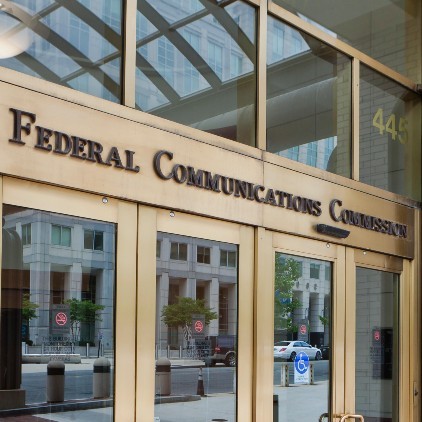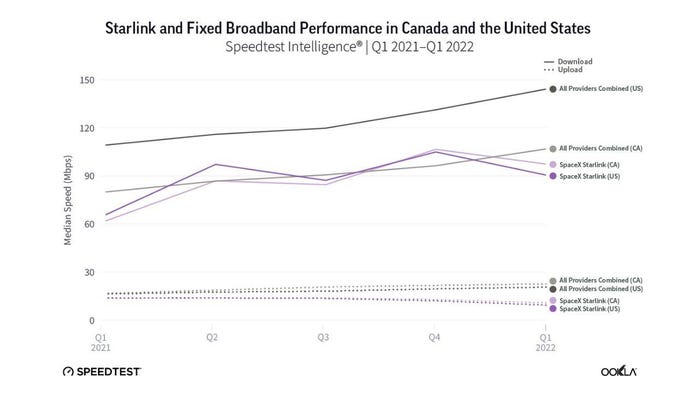FCC commissioner 'surprised' to learn of Starlink RDOF rejection
The FCC denied RDOF awards for Starlink and LTD, prompting cheers from the fiber industry and jeers from a fellow FCC commissioner, who said he learned the news while 'on a work trip.'

After months of industry upheaval and a significant push from fiber advocates against satellite broadband, the FCC officially rejected the long-form applications of SpaceX's Starlink and LTD Broadband, denying their awards from the Rural Digital Opportunity Fund (RDOF).
"Funding these vast proposed networks would not be the best use of limited Universal Service Fund dollars to bring broadband to unserved areas across the United States," said the FCC in a press release.
Figure 1:  (Source: B Christopher/Alamy Stock Photo)
(Source: B Christopher/Alamy Stock Photo)
The companies had been two of the main winners in phase one of the RDOF auction, with top bidder and fixed wireless company LTD set to receive $1.3 billion to cover 475,616 estimated locations in 11 states with gigabit fiber; and the fourth-largest bidder, SpaceX's Starlink, set to receive $885.5 million to cover 642,925 estimated locations in 35 states with low-Earth orbit (LEO) satellite broadband.
However, LTD has since had its status as an eligible telecommunications carrier (ETC) challenged in multiple states, thus rendering the company ineligible for federal funds. As a result, the FCC proposed a $2.3 billion fine against LTD for its defaulted bids just last month.
On the Starlink front, the FCC's early nod for LEO satellite service was followed by months of lobbying from groups like the Fiber Broadband Association, which urged the agency to thoroughly review long-form applications for each bidder to ensure they can fulfill their obligations. The group later submitted data, in collaboration with NTCA–The Rural Broadband Association, demonstrating that Starlink would not live up to expectations.
In addition to the fiber industry, Starlink took hits from satellite competitor Viasat. That company lobbied the FCC to drop Starlink from RDOF as well, telling the Commission last month that Ookla data showed the Starlink system was "backsliding" as more people use it and "providing median speeds significantly lower" than just a few months ago.
That Ookla data surfaced in the FCC's explanation of its decision, with the agency saying in a public notice: "We observe that Ookla data reported as of July 31, 2022 indicate that Starlink's speeds have been declining from the last quarter of 2021 to the second quarter of 2022, including upload speeds that are falling well below 20 Mbps."
Figure 2:  (Source: Ookla)
(Source: Ookla)
"We must put scarce universal service dollars to their best possible use as we move into a digital future that demands ever more powerful and faster networks. We cannot afford to subsidize ventures that are not delivering the promised speeds or are not likely to meet program requirements," said FCC Chairwoman Jessica Rosenworcel in a statement about the decision.
Noting that "Starlink's technology has real promise," she added, "the question before us was whether to publicly subsidize its still developing technology for consumer broadband—which requires that users purchase a $600 dish—with nearly $900 million in universal service funds until 2032."
Cheers and jeers
Gary Bolton, CEO of the Fiber Broadband Association, celebrated the news on Wednesday in a statement to the media, calling the FCC's denial of RDOF subsidies for Starlink "exciting and stunning news for all Americans."
In a note to members, Bolton added that Starlink's rejection is a "huge victory" for the 640,000 families that were due to get Starlink, saying that "they were at risk of being redlined" from access to the $42.45 billion BEAD fund and other state and federal programs.
But not everyone is as excited for those families.
In a statement following the news, FCC Commissioner Brendan Carr – one of the two Republicans on the Commission – said he was "surprised to find out via a press release—while I am on a work trip to remote parts of Alaska—that the FCC has made this significant decision."
Carr went on to add: "I will have more to say because we should be making it easier for unserved communities to get service, not rejecting a proven satellite technology that is delivering robust, high-speed service today.
"To be clear, this is a decision that tells families in states across the country that they should just keep waiting on the wrong side of the digital divide even though we have the technology to improve their lives now," he said.
The comments from Carr and Bolton represent an inherent and ongoing tension in the debate over how to solve the digital divide with federal subsidies: through faster-to-deploy technologies like satellite and FWA that can reach people sooner, or by laying the groundwork for the future with fiber infrastructure?
The rejection of SpaceX and LTD from the RDOF auction is another sign that the federal government, which has committed billions of dollars to closing the digital divide, prefers the latter option. The FCC's decision now frees up those 1,118,541 rural locations that were supposed to get service from Starlink and LTD to be covered by other federal subsidies. That's especially meaningful as states start readying their plans to apply for funds through the $42.45 billion in the BEAD program, which prioritizes fiber projects.
Still, there may be a glimmer of hope here for fixed wireless providers too, given the rural nature of these areas.
In a note about the news, New Street Research said "this decision makes it easier for Governors awarding Infrastructure Bill funding to target funds to those areas that Starlink and LTD had provisionally won" and called it a "slight positive" for major carriers like AT&T, Charter and Lumen.
Further, said the research note, "It also means that as the Infrastructure Bill funding will be used for those areas, the funding is less likely to be sufficient to offer wired broadband service in every unserved area, opening up some marginal long-term opportunities for fixed wireless providers."
Related posts:
— Nicole Ferraro, editor, Light Reading, and host of "The Divide" podcast.
About the Author(s)
You May Also Like




_International_Software_Products.jpeg?width=300&auto=webp&quality=80&disable=upscale)







